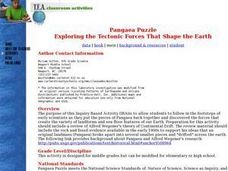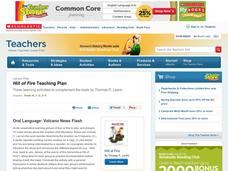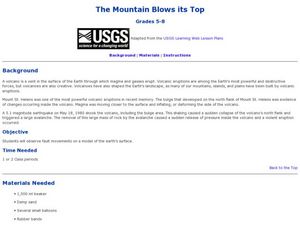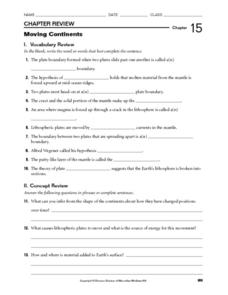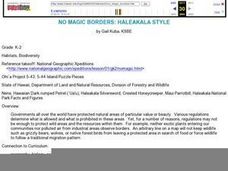Curated OER
TE Lesson: Tsunami Attack!
Learners examine how earthquakes, volcanoes, and landslides can trigger tsunami waves. They determine how engineers use sensors to detect the dangerous wave, and how they help design building that will survive the wave force and water.
Curated OER
The Effects of Volcanoes
Students use the internet to research the effects of volcanoes. They create a chart showing the negative and positive aspects that a volcanoe can bring to an area. Using PowerPoint, they create a presentation showing the negative and...
Curated OER
Pangaea Puzzle: Exploring the Tectonic Forces That Shape the Earth
Sixth graders follow in the footsteps of early scientists as they put the pieces of Pangaea back together and discovered the forces that create the variety of landforms and sea-floor features of our Earth.
Curated OER
Forces of Change
Second graders discuss various ways in which landforms change over time. They, in groups, research and create a reference book about landform change including tsunamis, earthquakes, weathering, erosion and volcanic eruptions.
Curated OER
Reading the Shapes of Volcanoes on Earth and Mars
Students compare and contrast the volcanoes of Earth and Mars, and examine specific volcanoes on Mars. They model the processes that create cone and shield volcanoes, and measure the slope angles of cone and shield volcanoes.
Scholastic
Hill of Fire Teaching Plan
Some books are perfect for drawing connections between multiple subjects. The book Hill of Fire becomes the hub for three very different, yet related activity ideas. First the class hones their oral language skills by creating an...
Curated OER
Volcanoes!
Students define what a volcano is. They discover where and why volcanoes occur. They study effects of volcanoes on the Earth system.
Curated OER
The Mountain Blows its Top
Students replicate a volcanic eruption. In this volcanoes lesson, students follow the provided procedures to show and describe how the inflation of a bulge led to the eruption of Mount St. Helens.
Curated OER
Structure of the Earth
Sixth graders investigate earthquakes and volcanoes. They demonstrate fault lines with a folded piece of paper, conduct an erosion experiment, and construct a volcano using clay, baking soda and vinegar.
Curated OER
Moving Continents
In this moving continents activity, students review the different types of plate boundaries, what causes earthquakes, and where volcanoes are formed. This activity has 10 fill in the blank and 9 short answer questions.
Curated OER
The Changing Earth
Students explore the Earth's crust. In this earth science lesson, students participate in 2 activities that demonstrate physical and chemical weathering. Students also play Jeopardy with topics including volcanoes, earthquakes,...
Curated OER
Volcano!-Thar She Blows!
Students describe how volcanoes are formed. They name the types of boundaries where volcanoes occur. They utilize models to illustrate the occurence of volcanoes and earthquakes along plate boundaries. They compare and constrast the...
Curated OER
Volcanoes In Japan
Sixth graders study the characteristics of volcanoes in this unit. They apply the research to the study of three volcanoes in Japan. They complete mapwork, identify indicators of impending volcanic activity, and describe the dangers...
Curated OER
Volcano Activity
In this volcano activity, students measure the slope of a volcano and its baseline and summit degrees. They identify the type of volcano, the type of lava and the type of eruption.
Curated OER
Earthquakes and Volcanoes
For this earthquakes and volcanoes worksheet, learners will review how volcanoes are formed and where they are found. Students will describe earthquakes and their magnitudes. Learners will use a table to answer questions about tsunamis....
Science Matters
Spaghetti Fault Model
Does increasing the pressure between two moving plates provide a stabilizing force or create more destruction? The hands-on instructional activity encourages exploration of strike-split fault models. The sixth instructional activity...
Curated OER
Geological Forces and Topography
Students discuss and research the Earth's geological processes. In this geology lesson plan, students study maps of Utah and the United States to learn about geological features. Students then complete the research cards for each area of...
Curated OER
Moving the Earth
Fifth graders simulate the three primary types of fault movement lateral fault, reverse fault, and normal fault by positioning their hands and applying pressure to them to observe the similar action taking place in the Earth's crust.
Curated OER
Extreme Weather
Learners examine different types of extreme weather and how to prepare for them. In this weather activity students explore different types of extreme weather and create disaster preparation posters for different types of extreme...
Curated OER
No Magic Borders: Haleakala Style
Young scholars discuss borders and boundaries. They discuss pollution and the fact that boundaries cannot stop pollution and that pollution affects even protected wildlife and plants. They participate in an activity in which they must...
Curated OER
Sculptors of the Earth
Students observe evidence of erosion and various rock formations that have formed as a result of erosion and weathering. Their task is to explain how the forces of weathering and erosion contributed to sculpturing these rocks into arches...
Curated OER
Eyewitness Accounts
Students role-play to show the eyewitness accounts of the eruption of Mt. St. Helens. In this volcanic eruption lesson, students act as reporters, eyewitnesses, and scientists to dramatize the eruption of Mt. St. Helens. They discuss the...
Curated OER
Tracking Current "Earth" Events
Eighth graders utilize Internet research skills, and practice their communication skills by presenting their research to the clas. They actively consider the types of hazards for humans associated with Natural Disaters and ways that...
Curated OER
Plate Tectonics
Students identify that most of mountain ranges found on all major land masses and in the oceans are external reflections of tectonic movements within the earth. They identify that earthquakes and related phenomena are caused by the...




